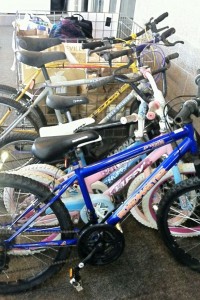Energy Corps member Erin Anderson is serving at Washington County Environmental Affairs / Boston Mountain Solid Waste Department in Arkansas. Erin writes:
I found myself at home for part of Wednesday, snowed in from work at the office. I had moved from Minnesota to Arkansas with little hope of encountering any snow at all, but this Wednesday I was flooded with wintery nostalgia on my drive back from Springdale, Arkansas. The all too familiar stop-and-go traffic and uncontrollable slipping and sliding as vehicles glide over fresh ice not only reminded me of the treacherous driving conditions that Minnesotans encounter daily for months at a time, but had me questioning my sanity for assuming that driving in Arkansas snow would be any different. It was not.
Nonetheless, I felt satisfied with the morning’s routine errand: every Wednesday throughout the months of January and February, I have had the opportunity to visit Bayyari Elementary’s Toyota Family Literacy Program in an effort to pilot the Environmental Protection Agency’s new food waste reduction program, entitled Food: Too Good To Waste. The program aims to help families work together as a household to reduce the amount of food waste generated by first measuring it, then implementing a strategy to reduce that waste, and finally measuring it again to see if the chosen strategy was effective. I learned about this program early on in my internship through a Webinar that our office watched and had been interested in piloting it with a group of students. I immediately thought that families new to the United States would be excellent candidates for the program due to the fact that they were most likely unfamiliar with the American diet and were, consequentially, producing a large amount of food waste at the household level.
I started to seek out groups that would be interested in piloting the program with me but was running into trouble finding teachers that were comfortable asking students to take on yet another “homework” type assignment. My supervisor suggested that I look into the Toyota Family Literacy Program (TFLP) in Springdale, Arkansas. TFLP strives to improve English language and literacy skills of Hispanic and other immigrant families. Participants in the program are typically adult English language learners attending a TFLP in their child’s school. And, to my surprise, I learned that the Hispanic population of Springdale constitutes 19.7% of the city! The pieces suddenly fell into place for me: as a Spanish language minor, I was super excited to have an opportunity to use my Spanish to reach out to a community in need of environmental education. I was extremely fortunate to find a willing partner in Bayyari Elementary’s Toyota Family Literacy Program and was invited to pitch the program to the adult students in the program. The students would ideally be able to take the materials home and educate their families about food waste reduction. I decided to implement the program in a six week time frame covering two different program paths: week one asked families to place all of their food waste for the week in a bag in order to weigh it and measure the level of waste produced; weeks two and three asked families to implement a strategy to reduce food waste (creating a shopping list with meals in mind, learning how to better store fruits and vegetables, eating older items first, etc.), and week four asked families to measure their food waste in bags again to evaluate whether or not the chosen strategy proved effective. Currently, students are underway with week five, which marks the beginning of the photo diary portion. Students will document food waste created in the home through photography and will reflect on why food was wasted through brief journal entries for the first three days of the week. During days four through ten, students will implement one of the aforementioned strategies to reduce waste, and days eleven through fourteen will consist of documenting waste again with photos and reflecting on whether or not a given strategy was effective.
So far, I have been impressed with my students’ eagerness to learn about food waste reduction and their interest in solid waste management in general. Though there is a slight language barrier between myself and the TFLP students, I think overall this has been an amazing experience for everyone involved. I truly believe that families new to the United States are in great need of receiving environmental and sustainability education, and I am so excited and fortunate to have a program like TFLP with whom I can partner to get more environmental educations program on the ground for non-native English speakers. There have already been three other schools in Springdale that have expressed interest in receiving lessons during their TFLP sessions! I look forward to furthering this initiative throughout the remainder of my Energy Corps term of service.
Born and raised in Minnesota, Erin recently graduated from Carleton College with a major in Environmental Studies and a Spanish language minor. Erin declared Environmental Studies as her major in 2010 and began doing environmental education with a program called Kids for Conservation. Through this initiative, she taught 5th graders a weekly, hour-long conservation lesson. Erin is very excited for her term of service with Arkansas Energy Corps and looks forward to incorporating her love for the environment and education into her work.









